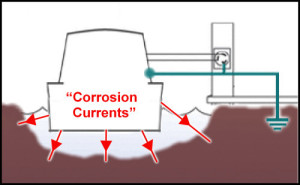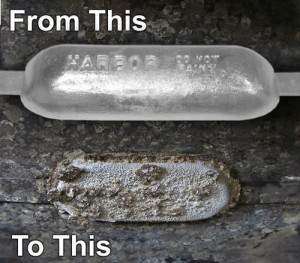Galvanic Isolator primer
Here’s a potted explanation of what Galvanic Isolators are, and why you very probably need one on YOUR boat……
If your boat is made of metal AND you connect to a shore supply, sometimes called an “Electric Hook-Up”, there is a serious risk of Galvanic Currents causing enormous damage to your boat’s metal hull. A Galvanic isolator can prevent this. When metals are immersed in water, they act as a battery, and when the circuit is completed, small electrical currents flow. We call these currents “Galvanic” or “Corrosion” currents. More about that later. What you need to know is this…
“When Galvanic Current flows, it corrodes metal from the hull of your boat – you really don’t want that”
 Although the corrosion currents can be quite small, over a period of months, your boat could shed many many kilograms of its hull, leading to pitting, and even holing. You can often see this along the water line of the boat. It’s well worth checking this right now!
Although the corrosion currents can be quite small, over a period of months, your boat could shed many many kilograms of its hull, leading to pitting, and even holing. You can often see this along the water line of the boat. It’s well worth checking this right now!
Believe me when I tell you that this is no fairy tale – my own hull lost around half a tonne in weight through corrosion that could have been prevented for just a few pounds with a simple Galvanic isolator (sometimes known as a Zinc Saver).
In fact, there are TWO types of corrosion current that are often mistaken for the same thing.  As the hull starts to corrode, pits begin to form in it’s surface and because the pits have a larger surface area than unpitted metal, the corrosion speeds up. Before long, the anodes will have been dissolved away, and your boat is left entirely at the mercy of corrosion – and it’s a boat-killer. Fortunately, the problem is not difficult (or expensive) to resolve. What you need to achieve is to SAFELY break the electrical earth that connects your boat to the shore supply. Note, I say SAFELY. You achieve this with a “Galvanic Isolator”, a simple electronic device that blocks corrosion currents from flowing, while allowing the safety electrical earth to remain intact. There are two types of galvanic isolators:
As the hull starts to corrode, pits begin to form in it’s surface and because the pits have a larger surface area than unpitted metal, the corrosion speeds up. Before long, the anodes will have been dissolved away, and your boat is left entirely at the mercy of corrosion – and it’s a boat-killer. Fortunately, the problem is not difficult (or expensive) to resolve. What you need to achieve is to SAFELY break the electrical earth that connects your boat to the shore supply. Note, I say SAFELY. You achieve this with a “Galvanic Isolator”, a simple electronic device that blocks corrosion currents from flowing, while allowing the safety electrical earth to remain intact. There are two types of galvanic isolators:
-
A Plug in galvanic isolator that simply connects in-line with your mains connecting cable.
- A Wire in galvanic isolator which is part of your boat’s internal electrical wiring.
Which is better??? Plug in or Wire in….
Both Plug in and Wire in galvanic isolators do exactly the same job. Neither is better than the other. The difference is in the installation. A Plug in galvanic isolator simply plugs onto the end of your electric hookup cable, so (in the case of our own galvanic isolators) you don’t need any tools or electrical knowledge to fit them. This is a MAJOR advantage. There is nothing to do wrong.
Wire in isolators aren’t difficult to fit, but they absolutely MUST be fitted correctly. An incorrectly fitted isolator may not work at all, and could even be dangerous. You’ll need to gain access to the power inlet connector on the boat, (which, on some boats, can be a challenge in itself). You also need to be able to use simple tools, and to work safely around electricity. The Voltages can be lethal, and the system must be fully isolated and powered down before working on it. If you’re 100% confident in your ability to do this, a wire in device could be a good choice for you. If not, a Plug in device would be a better option.
From the above, you probably conclude that my personal favourite is the Plug in device – simply because it’s SO easy to use even if “electrics” are a complete mystery to you.
Learn More… If you’d like to know even more about Galvanic Isolators, you can read a 2 part article HERE


